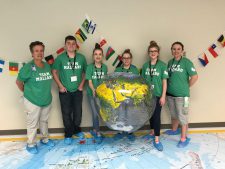In June, Shawnee Public Schools science teacher Cheyenne Branscum flew to Washington D.C. as Oklahoma’s only recipient of a Society for Science and the Public grant. The society invited Branscum, a Tribal member and Melot family descendant, to its advocate training institute. There she met fellow educators from across the nation, exchanging ideas and best practices on how to increase minority student participation in science, technology, engineering and mathematics.
Branscum’s association with the Society for Science and the Public began last year while she supported four of her middle school students who entered National Geographic’s GeoChallenge competition.

“Their project was the only one in Oklahoma to advance to regionals, and we got to take them to Dallas to compete,” Branscum said. “Those four students inspired me to apply for this grant. Seeing them represent not just Shawnee but our entire state made me feel like I needed to reach higher too.”
The SSP approved Branscum’s application, making her the only advocate from Oklahoma in this year’s class. The grant’s benefits to her students and her own professional development rose above what she imagined before applying.
“I have been nothing but impressed with everything they do,” Branscum said. “They are not only responsible for science fairs in high schools and middle schools, but they also provide other grants and provide Science News free to any high school teacher.”
Following the conference, the Shawnee Middle School educator refocused on finding opportunities for Native American students to participate in STEM competitions such as the Google Science Fair and SeaPerch, an underwater robotics program. Fifteen students comprise this year’s Shawnee Geo Team, approximately 50 percent of whom are Native.
“Our first outing will be to the Tulsa STEM Expo where the Geo Team will get to meet with more than 50 STEM-related companies,” Branscum said. “I am hoping this sparks some deep thinking and inspiration for their own projects. They will also be entering into a competition there where they are creating a clock using recycled materials that runs on wind power.”
As for the four students who initially inspired Branscum, they will present their project research this spring at the GeoTech Conference at Bishop Dunne Catholic High School in Dallas, Texas.
“This is a heavily attended conference that attracts internationally famous scientists like Jane Goodall,” Branscum said. “They are working on how to tackle the ever-growing problem of plastics.”
While the society’s grant covers some materials and transportation costs, Branscum and her students are in search for additional monetary sources for competition entrance fees. The team’s needs remain unmet by tight budgets, a familiar scenario across many Oklahoma schools. As her students’ reputation grows throughout the region, Branscum hopes to find funding capable of matching their impressive pedigree.
“I wish Oklahoma was as funded as the schools we go against in states like Texas, but my students have already proven that Shawnee is unstoppable,” she said.
To help support the Shawnee Geo Team, please visit donorschoose.org/branscum.
